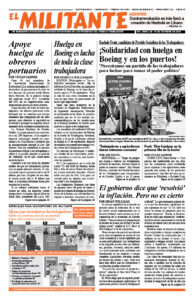On Sept. 26 two editors became the first journalists in Hong Kong convicted and sentenced on sedition charges for their news reporting under the city’s draconian new national security laws. The rulers in Beijing continue to tighten their repressive grip on the formerly semi-autonomous financial hub after massive anti-government protests there in 2019.
This March, Article 23 of the security law replaced a sedition law written by the former British colonial rulers. As well as widening police powers, it established new crimes of treason and insurrection, along with a blanket offense of inciting hatred against China’s rulers. And it calls for closed-door trials.
Chung Pui-kuen, 54, a top editor at the now defunct Stand News, was sentenced to 21 months in prison for sowing “hatred” of Hong Kong authorities. The “crime” of the popular online outlet was live streaming coverage of millions joining street demonstrations five years ago to oppose Beijing’s interference and demand greater political freedoms.
Patrick Lam, 36, who received a shorter sentence, was released for time served. Chung and Lam were arrested in a 2021 police raid, which led to Stand News being closed. The two editors spent nearly a year in jail before getting out on bail.
The landmark ruling has reinforced the chilling effect on freedom of expression, including for the media, as crackdowns tighten.
“On the 10th anniversary of the Umbrella Movement, nothing happened” on Sept. 28, Daniel Chan wrote the Militant from Hong Kong. Previous commemorations of the 79-day “occupation” of the city center demanding democratic elections were marked by small protests met by police mobilizations, he said.
Under Article 23, Chan writes, people can be “charged with incitement for virtually whatever they do, from scribbling slogans like ‘five demands, not one less’ on the back of a seat on a bus, to even citing ‘revolution is no crime, to rebel is justified,’ a famous saying by Mao Zedong.”
Mao was the longstanding Stalinist leader who came to power in the 1949 Chinese Revolution and waged ruthless repression against working people. He has been rehabilitated by the Xi Jinping regime to justify its own anti-working-class course.
To make sure of convictions, Hong Hong’s chief executive can now “state that a certain case is related to national security and has to be presided over by a judge” who is specially handpicked, Chan said. “The chief executive has already done so twice.”
Under the harsh new laws, at least 303 people have been arrested, and 176 individuals and five entities charged.

